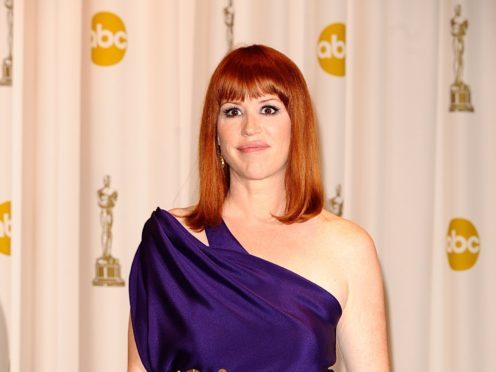Molly Ringwald has been praised for airing her concerns about her 1985 film The Breakfast Club, which she has said is now “troubling” to her due to scenes involving sexual harassment.
The actress re-examined the teen film, about five misfit students held in detention on a Saturday, while questioning its director John Hughes in light of the Me Too movement against harassment.
Writing in The New Yorker, Ringwald, 50, said she recently watched the film again with her 10-year-old daughter and, after fearing her child would be concerned by it, she “hadn’t anticipated that it would ultimately be most troubling to me”.
My second piece for the New Yorker has been published today! @NewYorker https://t.co/JH7vEDYTiR
— Molly Ringwald (@MollyRingwald) April 6, 2018
Ringwald wrote: “At one point in the film, the bad-boy character, John Bender, ducks under the table where my character, Claire, is sitting, to hide from a teacher.
“While there, he takes the opportunity to peek under Claire’s skirt and, though the audience doesn’t see, it is implied that he touches her inappropriately.”
She added: “What’s more, as I can see now, Bender sexually harasses Claire throughout the film.
“When he’s not sexualising her, he takes out his rage on her with vicious contempt, calling her ‘pathetic,’ mocking her as ‘Queenie.’ It’s rejection that inspires his vitriol.”
Ringwald noted that, despite all of this, the film sees him “get the girl in the end”.
She said that she thought about the film a lot after re-watching it, particularly after a number of women came forward with sexual harassment allegations against the likes of film producer Harvey Weinstein and others.
“If attitudes toward female subjugation are systemic, and I believe that they are, it stands to reason that the art we consume and sanction plays some part in reinforcing those same attitudes,” she wrote.
While praising the work of Hughes, who was responsible for two other films of the 1980s in which she starred – Sixteen Candles and Pretty In Pink – the star said she was “only vaguely aware of how much of John’s writing was” at the time.
She said there is “still so much” that she loves in the films, but that “lately I have felt the need to examine the role that these movies have played in our cultural life: where they came from, and what they might mean now”.
Throughout the piece, she paid tribute to Hughes, who died in 2009, and hailed his work as having a “cultural impact”.
Ringwald, however, added: “It’s hard for me to understand how John was able to write with so much sensitivity, and also have such a glaring blind spot.”
Following the publication of the article, Ringwald was widely praised on social media for her take on the film.
American author Jenny Han tweeted: “To all the people claiming that Molly Ringwald is ‘throwing John Hughes under the bus’– did you even read what she wrote?
To all the people claiming that Molly Ringwald is "throwing John Hughes under the bus"– did you even read what she wrote? It's a pretty tender, fair-minded piece. She's not "crying" about #MeToo. She's a grown woman examining her legacy and that of the man who helped shape it.
— Jenny Han (@jennyhan) April 6, 2018
“It’s a pretty tender, fair-minded piece. She’s not ‘crying’ about #MeToo. She’s a grown woman examining her legacy and that of the man who helped shape it.”
Writer Mark Harris said: “This piece by @MollyRingwald is one of the most insightful and honest pieces of cultural criticism I’ve read in ages, and a model of how to discuss movies within the context of when they were made without excusing their faults and failings.”
One reader described Ringwald’s article as “tremendously special” and “thoughtful”, while another said it was “vulnerable” and “terrific”.
This is a tremendously special, thoughtful article from Molly Ringwald that makes for a smart lesson in how to look at the social problems of older movies: not blindly, but not blindly rejecting, either https://t.co/AZCtabGPZn
— Meredith Borders (@xymarla) April 6, 2018
This Molly Ringwald piece everyone is talking about is as thoughtful and vulnerable and terrific as everyone says. https://t.co/yUKNapCc8W
— Jordan Horowitz (@jehorowitz) April 7, 2018
Weinstein, who has been accused of sexual assault and harassment by multiple women, has denied all allegations of non-consensual sex.
